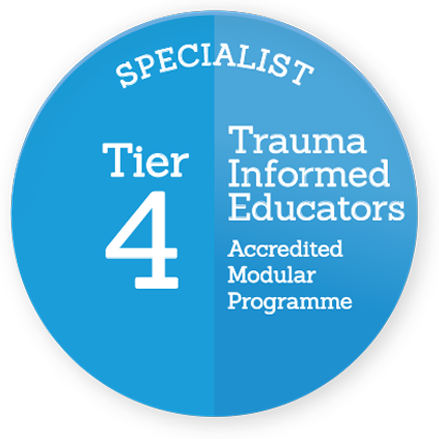Our Trauma-Informed Educators (TIEs) training equips delegates to become the lead ‘Trauma educator’ within their organisation, so they can deliver lasting and sustainable change as organisations move towards trauma-informed understanding.
It provides delegates with a thorough understanding of the prevalence and impact of complex and developmental trauma.
The training will include inputs from experts including those with organisation and cultural change knowledge.
About the training
The TIEs training is the most comprehensive Trauma-Informed Practice training Rock Pool provide. Delivered over 3 module and 9 training days, we will share evidence based best practice from international research on what works.
The training provides participants with the skills and information to enable them to advocate for Trauma-Informed practice and advise on approaches to trauma-informed work within their organisations. This will include:
- how to deliver a trauma-informed audit
- advise on policies and procedures
- better understanding on how to support staff and deliver supervision.
In addition, participants will be supported to deliver the Rock Pool Bitesize Trauma Introduction training.
By the end of this training we want to inspire and motivate delegates to facilitate the organisations they represent becoming truly trauma-informed.
Training Outcomes and Objectives
- Inspire and motivate the workforce to adapt their interactions with people through trauma-informed practice
- For professionals to understand the prevalence and causes of trauma
- To have an increased understanding of the different types of trauma (Post Traumatic Stress Disorder, Complex Trauma, Developmental Trauma and Cultural Trauma)
- For professionals to have a greater understanding of how trauma from early age manifests itself in behaviours and life choices of children, young people and adults
- To develop an understanding of the impact that trauma has on the child’s developing brain and nervous system
- To understand what is meant by differential diagnosis, how symptoms of trauma can be misdiagnosed and alternative models to the medical model
- To understand the importance of developing relational practice when working with people who have experienced trauma
- To explore and have an awareness of models and approaches to Recovery and Healing
- For professionals to understand the steps required in creating psychological safety and a trauma-informed workplace
- To provide an opportunity for individuals and teams to reflect on what stage of the trauma-informed journey they are at and to consider what are next steps
- To provide support and insight into organizational change models and what helps
- To develop an understanding of how to advocate and raise awareness of Trauma-Informed Approaches
- For professionals to understand the impact on those working with people who have been affected by trauma and how one’s own trauma can impact on your work
- To provide delegates with a train the trainer element so that they can be equipped to deliver a 2-hour ABC of Trauma – Tier 1 – Introduction & Awareness training to their teams and organisations in the future
Who should attend
- Social workers
- Family support workers
- Neighbourhood teams
- Safeguarding adult teams
- Early help workers
- Housing sector workers
- Voluntary sector workers
- Health practitioners
- Police and police support staff
- Other frontline care professionals
Training topics
- Introduction to Trauma
- Different types of Trauma
- Diagnostic Criteria and Differential Diagnosis
- Impact of Trauma
- Impact on Neurobiology
- Attachment and Peer Orientation
- Trauma-Informed Approaches
- The five principles of Trauma-Informed Approaches
- Processes and best practice for Trauma-Informed Approaches
- Benefits of Trauma-Informed Approaches
- Supporting Organisational Change
- Organisational Change Model
- Advocacy and Training
- Support and Supervision of Staff
- ABC of Trauma Tier One Introduction and Awareness Train the Trainer – Script and practice
Next steps
- If you are interested and would like to find out more information about this training course or any of Rock Pool’s work, please contact us:
Email: admin@rockpool.life
Tel: 01803 659191
All course materials.
Cancellation Policy
The customer may cancel a training course provided that written notice is given to the supplier at least 28 days before the first training date.
If the notice to cancel is provided less than 28 days before the first training date, no refund will be made to the customer.
If the notice to cancel is provided more than 28 days before the first training date, 100% of the charges will be refunded to the customer.
Click here to view Rock Pool’s Training Courses Terms and Conditions
Contact Us
Contact us
